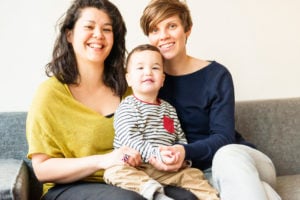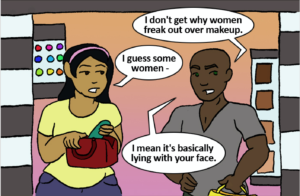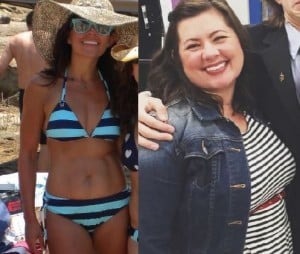
Family portrait of a queer couple sitting on a couch together with a small child on their laps.
“So, which one of you is the mommy?” asked the kindly looking older woman on the city bus.
It’s a question that my wife and I get a lot when we’re out in public with our kid. We’re queer parents, and we often aren’t the kind of family people are expecting to see. I’m a cisgender queer woman, and my wife is non-binary, and we both identify as mothers to our one-year-old son.
He was conceived using sperm provided by a known donor, and I carried the pregnancy and gave birth. Our child calls me “mama” and my wife “ma.”
When people ask us questions like this, it’s possible that they just haven’t met many queer people before. It’s also awkward, though, because questions such as “who’s the mom?” rest on heteronormative assumptions – that is, the idea that heterosexuality is compulsory, and therefore each child must have one mother and other father.
And to some degree, answering them has to include telling them that they’re wrong. It’s not exactly a comfortable thing to do.
“Oh,” I said, trying to make sure my voice didn’t sound defensive. “We both are. We’re married, and we’re both his moms.”
There was a pause. It’s the pause in which we wait to find out if the person asking about our family is just friendly and curious – or if they have anti-queer sentiments.
“Well, isn’t that just something!”
It’s commonly understood in our culture that parenting can be hard. There’s a lot that I have in common with my straight friends who are parents, because we’re all struggling to raise children the best that we can in a world that is complicated.
But there are some struggles that are particular to being an LGBTQIA+ parent. That’s true for any parent who is also part of a marginalized group, but I’m focusing on LGBTQIA+ parents specifically, because that’s what I have personal experience with and feel most qualified to talk about.
One thing that I’ve learned, in my time doing this whole parenting thing, is that there are many, many straight people who want to be my ally. These are people who are “on our side,” so to speak – they think families like mine are great, and wish they would be more accepted.
The trouble is, they often don’t really know how to go about supporting LGBTQIA+ families, and sometimes they’re afraid to ask. They don’t want to say the wrong thing, and often aren’t sure what to do.
Sometimes these people are friends of mine, and sometimes they’re complete strangers that I meet on the bus. Sometimes they’re parents themselves, but sometimes they’re childless folks as well. The one thing that they have in common is that they want to show support and have the best of intentions – but they’re confused about where to start.
And I can see where they’re coming from! Being supportive to a community you aren’t part of can be complicated because you don’t always know what their needs are. On top of that, we often get conflicting messages about what to say, or what not to say. Being an ally to LGBTQIA+ families shouldn’t have to require an advanced degree.
So the purpose of this article is to take you through a few simple steps towards being a better ally to queer parents and families in your life. And even if you don’t have any queer families in your life, you never know when you might meet one on the bus!
Here are seven ways to be a better ally for LGBTQIA+ families.
1. Check Your Language Around Parenting
We live in a deeply heteronormative, cisnormative, and patriarchal society. What this means is that heteronormativity normalizes and praises heterosexuality, making being straight the norm, while any deviation from that norm is labeled as “other.” Cisnormativity does the same thing, but with gender, normalizing those of us who are cisgender at the expense of our transgender and gender non-conforming peers.
And this is a problem for everyone – but it poses particular challenges for anyone who isn’t straight or doesn’t identify with the gender that was assigned to them at birth.
The heteronormativity and cisnormativity that’s already intense in our wider culture—well—they seem to get the volume turned up in parenting culture. Our parenting ideals are based on a lot of assumptions about gender and sexuality, and that is reflected in the language that people use when they talk about parenthood.
“Oh, kids always behave worse when their mom is around! It’s a fact!”
“There’s nothing more natural than a mother breastfeeding her child!”
“Whatever you do, don’t let dad dress the kids! Who know what he’ll put them in!?”
These are just a few of the kinds of things that you commonly hear about parenting. They may seem innocuous at first. But they’re all based on the idea that “mother” and “father” are two distinct and separate roles, and that they are universal from family to family. They also often include a biological component. For example, it’s assumed that mothers are always the ones to give birth.
If you want to be a better ally, you need to take a good hard look at your own language. When you say things like “every little kid needs their mom sometimes,” you’re (albeit unintentionally) insulting families that don’t include a mother figure, such as families with two dads.
You may not being doing so on purpose, but the fact is that you don’t have to intend to cause harm in order to do so.
A lot of these attitudes are deeply ingrained, and it takes time to unlearn them. But I believe it’s worth it.
2. If You Have a Question, Take the Time to Think About What You’re Asking
Once, an acquaintance was admiring our son’s beautiful eyes. “Wow!” she said. “Does his dad have blue eyes, too?”
But our child doesn’t have a dad! When I tried to remind her of that fact, she brushed me off saying “Oh, but you know what I meant!”
It’s fine to have questions about the LGBTQIA+ families in your life, but it’s important to be respectful. Take a moment to think about what it is you actually want to ask. There are ways to ask that don’t rest on those heteronormative and cisnormative assumptions.
So, if you are curious about who gave birth to a child, you can ask “Did one of you give birth – and if so, which one?” rather than “Who’s the real mom?”
If a transgender man has just given birth, it’s fine to ask how he’s enjoying new parenthood, but don’t assume that he’s experiencing “motherhood.”
And in the example above, that person could have easily asked, “So are there a lot of blue eyes in his genetic background?” without assuming that my child has a father.
Which brings us to….
3. Ask for People’s Parenting Titles, Rather Than Assuming
If someone hasn’t told you that they identify as a mom or dad, especially if they’re part of an LGBTQIA+ family, it’s a good idea to not assume.
Identity is deeply important to many people, and how we identify with our children is no exception. The norm in our culture is to assume that every parent that we read as a woman is a mom, and every parent that we read as a man is a dad. The reality, however, is far more complex.
In my family, my wife and I both identify as mothers. Other families do it differently! I know of two gay men who both go by “daddy” with their toddlers, and differentiate based on context. One lesbian couple feels very strongly that one of them is the “mom” and the other is the “dad,” while another both go by “mama,” but also use their first names. Some parents are deeply uncomfortable with gendered parenting titles, and prefer to go by “baba” or “mapa.”
And while it might feel awkward at first, you make it so much easier for LGBTQIA+ parents when you show us respect and honor our actual identities!
It only takes a second to ask “What do your kids call you?” or “Do you like to be called a mom, or something else?” but it makes a difference.
4. Speak Up For Us with Your Straight Friends
Being an ally means being an ally all the time, not just when your queer friends are around.
That means that you need to make those adjustments in your language all the time, even when you’re surrounded by straight and cisgender people. Again, this might be uncomfortable, but recognize that is a reality that your LGBTQIA+ friends deal with all the time.
That means using people’s correct parenting titles, asking the real questions, and challenging gender essentialism in parenting talk all the time. And it means gently correcting your straight friends, too.
So, if you’re a mother, and you find yourself in a group of straight mothers, and someone says that “every child needs a mother’s love,” you should point out that many kinds of families don’t include mothers, but those children are plenty loved. Or if you hear someone refer to a parent you know to be a baba as a dad, you correct that person.
It might not feel like it matters, but every time you speak up, you make it a little less likely that I’ll run into someone who’s never even heard of families like mine tomorrow.
5. Remember That There Are Many Ways to Become a Parent
One of the things that was hardest for me, as a new queer mama, was dealing with the way that the parenting world talks about conception, pregnancy, and birth.
I still cringe when I hear phrases like “making a baby” or “trying to get pregnant,” which, many times, are just euphemisms for unprotected heterosexual vaginal intercourse.
Jokes like “they’re so much fun to make, but so hard to take care of!” may seem funny to some, but they’re also hurtful. The fact is that there are many different ways that people become parents, and not all of those ways involve pregnancy, and not all of them involve sex.
Some parents adopt, some parents use gestational surrogates, and some parents conceive through artificial insemination. Please, don’t erase us!
6. Celebrate Non-Gestational Parents of All Kinds
My wife is an amazing mother. She plays with our kid, feeds him, bathes him, changes approximately one thousand diapers a week, reads bedtime stories, and generally does all the work that any parent does for their child. She didn’t give birth, but that doesn’t make her any less a mother – and our kid knows it.
Our culture makes space to celebrate fathers, but what about all of the wonderful non-gestational mothers, babas, and other non-binary parents out there?
They’re working just as hard, and they deserve just as much of our love! Whether through adoption, or supporting a partner or gestational surrogate while they experience pregnancy and birth, non-gestational parents are awesome.
For example, it’s just as vital to offer support, congratulations, and love to a non-gestational parent after the birth of a child as it is to offer those things to the parent who just gave birth (if there is one). And adoptive parents often need something like a “baby shower” just as badly as any other parents.
It’s often easy to gloss over non-gestational parents, especially when our culture doesn’t have a ready-made role for them. But when we pay attention, celebrating and supporting them doesn’t turn out to be that much different than celebrating and supporting gestational parents!
7. Realize That LGBTQIA+ Parents Still Face Many Legal and Social Barriers
It makes a huge difference for LGBTQIA+ families when you adjust your language and expectations surrounding parenting to include us. But sadly, it doesn’t change the fact that many of us are still up against some very real barriers.
While same-gender marriage being legal does make a difference for many of us, it doesn’t fix all of the problems – and we still have a long way to go for our families to be safe and get all of their needs met.
My son was born about one month before same-gender marriage became legal in our state. That means that my marriage to his other mother wasn’t legally recognized at the time of his birth, and so mine is the only name on his birth certificate. For my wife to have any parental rights, she’ll need to go through the formal adoption process.
We’re working on it, but it’s a lengthy and expensive legal process, which is further complicated by the fact that we used a known donor to get pregnant, rather than going with the more expensive option of a sperm bank.
But unless the laws are changed, it’s still perfectly legal to discriminate against us in our state. We can be denied housing for being queer, we can be fired for being queer, and doctors can even refuse to treat our son because they “disagree with our lifestyle.” All of that makes our family vulnerable.
And transgender parents face even more difficulties. A trans dad that I know had to deal with the indignity of being labeled as a “mother” on his daughter’s birth certificate, because even though he is legally a man, there was no place on the birth certificate for a father who gave birth.
Educate yourself about the laws in your state – and do what you can to challenge those that hurt LGBTQIA+ families. That might mean voting, it might mean protesting, it might mean donating to organizations that are fighting to add sexual orientation and gender identity to anti-discrimination laws.
But whatever it is, it could make a very real difference to LGBTQIA+ families in your area, whether you know them personally or not.
***
It can be hard to be an ally when you don’t know where to begin. But with little bit of information and effort, it’s totally worth it.
And if enough people are willing to make that effort, and to listen to LGBTQIA+ families when we tell you what we really need, then maybe families like mine won’t have to be so nervous when we have to take the bus.
[do_widget id=’text-101′]
Katherine DM Clover is a mother, recovering fine artist, and a writer focusing primarily on parenting, queer issues, and feminism. Find her work at Ravishly, Romper, and many other fine publications. She lives in Detroit, Michigan with her wife and child, and their three cats, and she just learned how to make pie crust. Read her blog, Post Nuclear Era, or follow her on Twitter @postnuclear_mama.
Search our 3000+ articles!
Read our articles about:
Our online racial justice training
Used by hundreds of universities, non-profits, and businesses.
Click to learn more




















